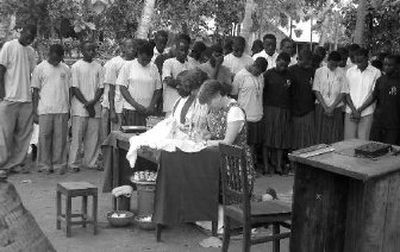Trip inspiring

When missionaries visited the childhood churches of three area women, the visitors instilled in them a commitment to their church and their faith, nourishing a global awareness of bonds with God’s children everywhere.
Since participating in a recent two-week trip to Tanzania and the companion diocese of their Lutheran synod, the women now are visiting local congregations to inspire others.
Margie Fiedler, Marj Nishek and the Rev. Ann Frerks joined 10 other people from the Eastern Washington Idaho Synod of the Evangelical Lutheran Church in America on a fall visit to the Tumaini Lutheran Seminary, a secondary school in Malinyi, Tanzania.
They shared in the community’s life and work, which included completing a brick duplex to house school staff, joining daily worship and celebrating the graduation of a class of 80 of the 400 students.
Fiedler, who is vice president for marketing and investment with the national ELCA out of Coeur d’Alene, first connected with the partnership while she was associate to the Eastern Washington Idaho bishop from 1996 to 2004. On this visit, she gave the commencement address.
For Nishek and her husband, Wayne, of Trinity Lutheran Church in Bonners Ferry, Idaho, it was a time to renew ties with Tanzania, where they served three years as missionaries and four years in a project developing windmills, water pumps and biogas technology.
For Frerks, of Emmanuel Lutheran Church in Cheney, the experience was part of her three-month sabbatical. She preached at several morning and evening outdoor worship services that students attended.
In 1988, the national ELCA matched about 20 U.S. synods with dioceses in Tanzania. Since 1989, the Eastern Washington Idaho Synod has had exchanges with the Ulanga Kilombero Diocese of the Lutheran Church in Tanzania, hosting guests and receiving and sending exchange teachers and visitation teams.
Fiedler, who also is on the national Global Ministries Committee, says the model has changed from sending U.S. missionaries to help people elsewhere, to one of learning from each other. So the fast-growing Tanzanian church might send evangelists to help Northwest churches grow.
Instead of sending missionaries abroad, she says, “We send funds to teach people there to be doctors, nurses, teachers and pastors among their own people.”
Eastern Washington Idaho Synod churches raise funds to help pay teachers, carpenters and students’ tuition in Tanzania. The synod also helps support a hospital.
“Companionship makes the world smaller,” Fiedler says. “We can understand what it means to be God’s children. It’s about building relationships, so we can bring peace and justice to the world.”
To prepare the local team for its trip to Tanzania, organizers suggested participants go with their hearts and minds open to receive love, hospitality and ideas.
“Our role was first to be with people there and then to make people here aware of the companionship,” says Nishek, who led the group with her husband. “The Tanzanians opened our eyes to life there.”
Their experience started with hundreds of smiling, singing students in yellow T-shirts lining the road to greet them.
“There’s no way to understand what life is like in Tanzania without going to work and worship side-by-side,” says Nishek, who serves on the synod’s Global Mission Companion Task Force and helped plan the trip.
For her, companionship is learning to appreciate the beauty of the land and people as part of God’s gift.
“People in Malinyi wear their faith on their sleeves, expressing their dependence on God every day. Their expression is natural and clear in their faces,” she says.
“We learned from them, so I am better able to relax, knowing God is guiding us, not asking us to do more than we can, but giving us the capabilities to do more.”
Frerks gained an appreciation for where mission dollars go and for the national church facilitating the connection with the global church.
After two weeks with poor people, she has a new understanding of the Beatitude “blessed are the poor.” She returned wondering “if we really are rich,” because for Tanzanians she met, life is more than materialism.
“They value relationships, not what people have,” Frerks says. “Every day the pastor at the school says: ‘God is good, all the time. All the time, God is good.’ In the midst of hardship and difficulties, God is constant.”
Even though Lutherans there do not ordain women, they wanted a woman pastor to come.
“Life, work and worship there is physical. They dance, sing and stand, involving their whole bodies,” says Frerks. “The communal presence is powerful. They know they are dependent on one another for survival.”
Nishek, who with her husband also served with the Peace Corps and other organizations in Bolivia, India, Lesotho and The Gambia, contrasted the short-term experience – seeing the best of a situation, with hosts making a special effort to be sure everyone feels comfortable – with living somewhere for several years and experiencing the highs and lows of life, becoming part of what is happening, learning the language and being better able to communicate.
She values both opportunities, knowing that some people can go for only a short time, while others may volunteer to teach for two years or more.
In Tanzania, the local team joined students and the community to do projects the companions chose. As they passed bricks from person to person or peeled garlic, they learned some Swahili words, taught some English words and shared songs.
Now they hope to stir curiosity about Tanzania in their churches and the synod, so they may spark the global and faith commitment missionaries stirred in them many years ago.